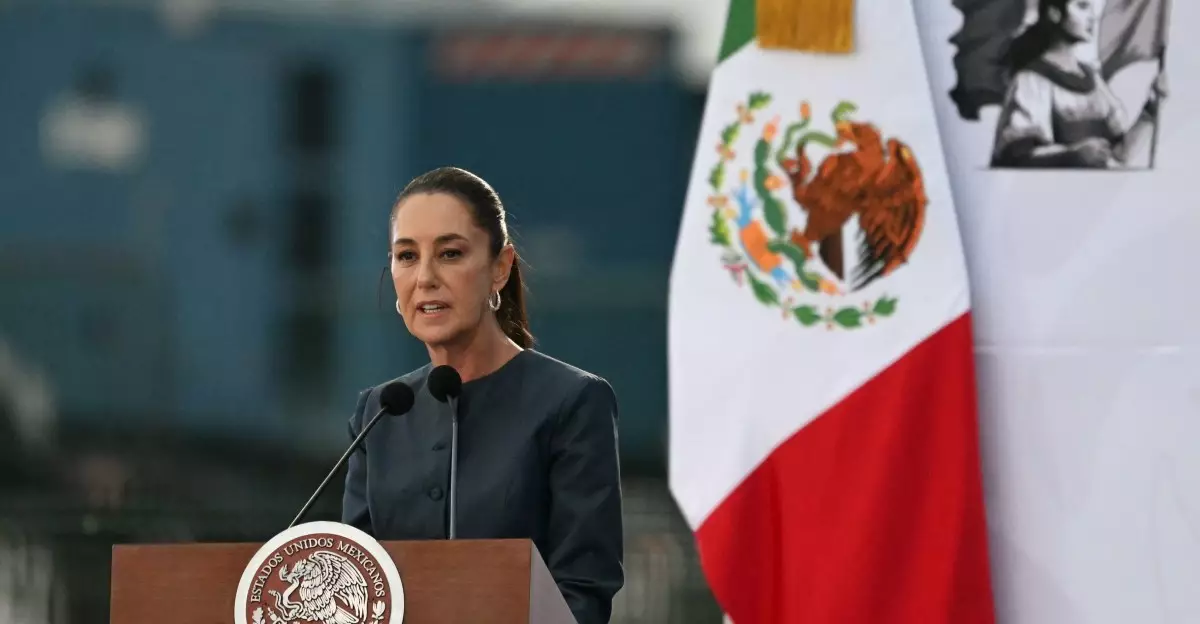In an age where technology often influences public perception, the decision by an American tech giant to rename a significant geographic feature raises critical questions about sovereignty and identity. The recent move by Google, which has opted to label the Gulf of Mexico as the “Gulf of America” for users in the United States, has ignited controversy and prompted immediate action from Mexican President Claudia Sheinbaum. This situation is emblematic of the broader struggle between national identities and corporate decisions. While many might view this name change as a trivial matter, it is, in fact, a profound assertion of territorial integrity and respect for cultural heritage.
Legal Battles and Cultural Symbols
The lawsuit initiated by President Sheinbaum’s administration epitomizes the fierce protective instincts that nations exhibit over their geographical identifiers. From her firm declaration that the U.S. cannot unilaterally dictate the name of a shared geographical space, it is clear that Mexico is standing firmly on ground it believes is intrinsically connected to its national character. By emphasizing that each country possesses equal rights to the geographical naming of its own territories, Sheinbaum invokes principles of international law, including the idea that names carry significant cultural weight and identity.
The lawsuit isn’t merely an attempt to revert the Google Maps nomenclature but represents a battle against a cultural erasure that goes beyond maps. It signifies a societal rejection of colonial and imperial histories that have long affected the naming of places and identities throughout Latin America. By asserting their position, Mexican officials are attempting to reclaim a narrative that recognizes the Gulf’s historic and geopolitical significance to Mexican culture.
Technological Compliance Amidst National Pride
Google’s action has drawn criticism not just from the Mexican government but is reflective of a troubling trend where technology companies are becoming unwitting participants in political struggles by complying with governmental pressures. Following the Trump administration’s orders, Google and subsequently Apple adopted the new nomenclature. This pandering to government dictates raises questions about the autonomy of tech companies versus their roles in serving public interest. Are they simply tools of state power, or do they have a moral obligation to support cultural integrity and respect international boundaries?
Moreover, the discrepancy in how Google presents the Gulf based on the user’s location—calling it the Gulf of Mexico within Mexico’s borders while branding it differently elsewhere—can create confusion and perpetuate cultural division. It can promote a sense of “otherness” and present a version of reality that validates governmental narratives over collective historical truths.
An Intertwined Response from the International Community
What comes next is critical; as global interconnectedness continues to rise, so too does the power of public opinion in driving corporate policies. Consumers worldwide are growing increasingly aware of the influence that geography and its representation through technology has on their sense of identity. As such, technological avocations in geopolitics have stirred a ripple effect across societal structures, serving as a catalyst for individuals to reclaim their narratives.
The reception of Sheinbaum’s resolution also strikes a chord with other nations who feel that their cultural identities may be compromised by similar actions in their own territories. This incident serves as a reminder that many countries possess rich histories and identities that must be acknowledged and respected.
The Unsettling Trend of Name Changes
This incident is not isolated. The tension between name changes and cultural perceptions manifests in various global contexts—whether instances of renaming streets, places of significance, or, as seen here, important geographical features. Each case carries potential ramifications for international relations and showcases the ongoing struggle for countries to assert their identities amidst external influences.
While the Gulf of Mexico has been a geographical reality for centuries, the rebranding to “Gulf of America” symbolizes a more profound attempt at rewriting history through the lens of power. Such trends demand a robust response from nations around the world to protect their cultural narratives and histories against external forces that may challenge their legitimacy.
In this ongoing saga, President Claudia Sheinbaum’s proactive response is admirable. It embodies determination and a call for respect not just for Mexico but for global cultural identities, asserting that such matters of identity and nomenclature are far too significant to be dictated by political whims or technological convenience.

